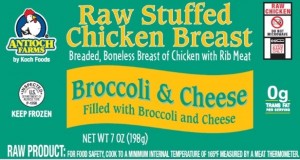 The U.S. Department of Agriculture’s Food Safety and Inspection Service (USDA FSIS) has released a list of stores where frozen chicken entrees, which have been linked to a Salmonella outbreak, were sold. The list is 60 pages long.
The U.S. Department of Agriculture’s Food Safety and Inspection Service (USDA FSIS) has released a list of stores where frozen chicken entrees, which have been linked to a Salmonella outbreak, were sold. The list is 60 pages long.
The raw, breaded frozen chicken entrees made by Aspen Foods and sold under a number of brand names have sickened five people in Minnesota. They were sold at Aldi, Food Lion, Kroger, Safeway, Save-a-Lot, and Walmart stores nationwide and dozens of other stores in 40 states, the District of Columbia and Puerto Rico.
The breaded chicken items were labeled as “chicken cordon bleu,” “chicken Kiev” or “chicken broccoli and cheese” and have the establishment number “P-1358” inside the USDA mark of inspection. They were sold under the brand names Acclaim, Antioch Farms, Buckley Farms, Centrella Signature, Chestnut Farms, Family Favorites, Kirkwood, Koch Foods, Market Day, Oven Cravers, Rose, Rosebud Farm, Roundy’s, Safeway Kitchens, Schwan’s, Shaner’s, Spartan and Sysco.
This is not the first Salmonella outbreak that has been linked to these products produced by Aspen Farms. The USDA says the company has a “systemic Salmonella problem” and has issued a public health alert about these products because the company has not recalled them. Consumers who have purchased these products, should not eat them.
Salmonella bacteria live in the intestines of animals and are shed in their feces. Contamination can happen during slaughter, and transmit disease when food tainted with microscopic amounts of fecal material is ingested. The infection called salmonellosis causes diarrhea that can be bloody, abdominal cramps, vomiting, nausea, and fever. Usually these symptoms develop within six to 72 hours after exposure and last up to a week. But for some people, the diarrhea may be so severe that the patient needs to be hospitalized. Seniors, children and those with weakened immune systems are most likely to develop a severe illness.
Anyone who has eaten these products and developed symptoms of an infection should see a doctor and mention exposure to Salmonella. A stool culture can confirm an infection and determine if that case is part of an outbreak. Salmonella infections are reportable conditions.




